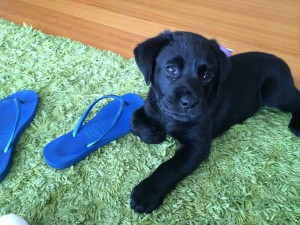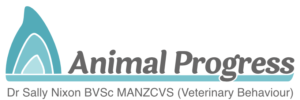Giving Your Pup a Head Start
Early development is an important time for the learning of many skills, including motor skills and social skills. The critical time for a pup to develop many skills that will set it up for later in life is between 3 and 12 weeks of age.
A pup should be with his/her mother and littermates until about 8 weeks of age. Owners can help their pup’s development significantly by concentrating on providing positive, happy opportunities from the time they bring the pup home until he/she reaches 12 weeks of age.
Positive emotional experiences associated with various stimuli can enable a pup to learn appropriate behavioural responses to those triggers. Of course, positive interactions throughout the life of the dog is recommended, but that early period of development is critical for the pup to develop skills so that it may react appropriately to various situations in the future. Genetic predisposition, environment and other experiences will also play a role, but efforts early in development can give owners the chance to offer their pup a good head start and prevent some behaviour problems developing later in life. It will also act to create a strong bond between owner and pup.

A pup who has positive experiences meeting many other dogs of various breeds and ages in different places and settings is likely to learn appropriate social skills and will be far less likely to become aggressive with other dogs.
A pup who meets many different people in positive ways may become more social with people and enjoy new encounters. And certainly, the unpredictability of children can be daunting for a dog so meeting supervised children as a pup and having the children be gentle will help a pup enjoy the company of children when it becomes an adult.
Children should not be forceful and parents need to make sure the contact the children have with the pup always gives the pup the ability to move away. The children should not chase a pup, hold a pup or corner a pup who wishes to be left alone. The pup should know it can always escape.
Puppy preschool is a great opportunity to socialise pups with other pups in a fun and non-threatening environment. Ask your local veterinarian about any puppy preschool programmes. There is a limit to numbers so that pups do not get overwhelmed. It is good to enrol your pup so the he/she can start young, well before they turn 12 weeks old.
A pup who has had positive experiences when exposed to thunder during early development may be at a lower risk of developing noise phobia than a pup who does not experience a thunderstorm until adulthood.
An Adaptil™ collar is a simple and easy way to help your pup in the transition to the new home. It is very scary for a pup to leave his/her mother, littermates and known environment. An Adaptil™ collar can be fitted. It is a special collar that, when on the pup, emits the scent of a calming hormone that the pup would otherwise get from his/her dam. Only dogs can smell the hormone. It does not affect people. The collar is left on and it continues to affect help calm the pup for a month, thus aiding with the adjustment to his/her/new home in that critical time of development when positive experiences are essential. Ideally have the breeder attach the collar before picking the pup up so that the hormone is being emitted when you take the pup from his/her dam and littermates.

